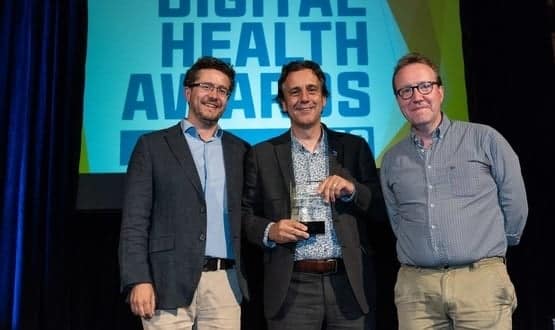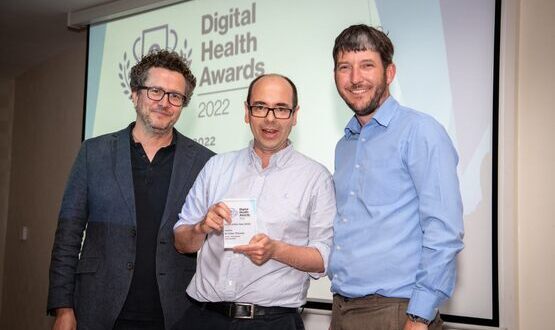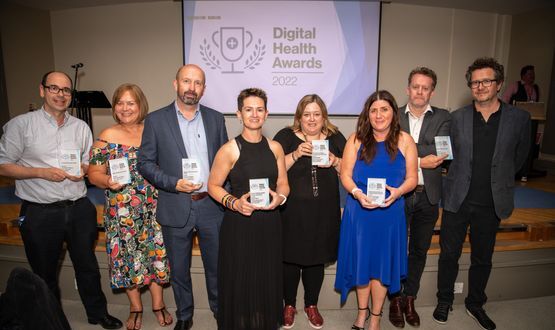2018 Digital Health Award Winner Profile: Andy Kinnear
- 21 September 2018

Andy Kinnear, the winner of the inaugural Digital Health Award for outstanding contribution to the profession, has had a career path he describes as “slightly haphazard”. So why is the director of digital transformation at South, Central and West CSU so convinced of the value of professionalising the field? Claire Read speaks to him to find out.
In the last year of his undergraduate degree, Andy Kinnear took a module on medical geography. It centred on epidemiology, disease patterns and public health issues, and it was interesting enough that, on graduation, he went into the field of NHS information analysis. He spent seven or eight years crunching stats, seeking to turn mathematical processes into actionable insight.
Almost three decades on and he finds himself as one of the best known chief information officers in the English health service – sufficiently well respected for his peers to have voted him the winner of the first Digital Health Award for outstanding contribution to the profession. But ask him how he went from data analysis to directing digital transformation programmes across regions and he speaks of getting there “despite the system, not really because of it”.
“I spent seven or eight years in as an information analyst,” explains Kinnear, who is now director of digital transformation at South, Central and West Commissioning Support Unit. “When primary care trusts [PCTs] were created, each of the lead analysts got assigned a geography to look after.
“And then they started to say: ‘Oh actually what we think we need is somebody to lead on information governance, and we’re going to ask them to report to you.’ And then it was: ‘We’re going to do some work on data quality, and we’re going to ask them to report to you.’ And then: ‘We need a couple of engineers to do the IT support for GP practices, and we’re going to ask them to report to you’.”
A journey to professionalisation
It meant that, within a year, he was leading a team of 12 across the full digital portfolio. From there, he didn’t look back. But it is not a career journey he wants others to repeat. “I just don’t think the next generation, and certainly the one after that, should go through this slightly haphazard journey.
“I think that digital has become so critical to healthcare that the people who are in charge of it need to be proven, competent, invested-in individuals with the necessary skills, but also maintaining a level of accreditation to fulfil that function.”
He’s spent a lot of time trying to create such a setup, and it is those efforts which his peers voted to recognise with the Digital Health Award. As chair of BCS Health for instance, Kinnear has been integral to the foundation of the Federation for Informatics Professionals. It’s an organisation he sees as crucial to professionalisation.
“If you look at the way other professions have become mature and have successfully developed, one of the things they’ve done is they’ve had active and vibrant professional bodies,” he argues.
“And so my work with the BCS [The Chartered Institute for IT] and then colleagues in Socitm and in CILIP [Chartered Institute of Library and Information Professionals] and in IHRIM [The Institute of Health Records and Information Management] with the medical records managers and now with AphA [Association of Professional Healthcare Analysts], collectively to create the Federation of Informatics Professionals has been one of the jigsaw pieces to create a profession.”
The need for CPD
He sees the Federation as “the umbrella entity that will then deal with professional registration, accreditation and certification” for non-clinical IT professionals in healthcare. The Faculty of Clinical Informatics – currently being created – will then fulfil the same role for clinical digital leaders.
Kinnear argues accreditation and registration is not enough in itself, however. “The next aspect is you professionally educate and train people to be professionals, and then you have a level of expectation that they maintain that accreditation, so they have continuing professional development.”
He believes the NHS Digital Academy will be an important part of this. “If you follow this story through to the conclusion I like to think of, we’re going to have graduates graduating from the Digital Academy next spring, who will have effectively reached the professional competency standard that’s the top of the tree for digital health leaders.
“These people will achieve their accreditation through the FedIP or through the Faculty, depending on whether they’re a clinician or a non-clinical IM&T leader. And they will continue to maintain a professional body membership that will support them in their development going forward.”
Kinnear’s hope is that, in two or three years from now, there will be a voluntary adherence to professional standards. But he is also keen to see it become more or less mandated by NHS organisations.
“So in the way that they wouldn’t appoint a doctor who wasn’t accredited by a royal college and they wouldn’t appoint a finance director who didn’t have a set of professional finance qualifications, I don’t think they should appoint a CIO or CCIO who hasn’t got the badge,” he contends.
“The real success is when all the chief execs recognise the value of professionalising digital leadership.”
Saluting the forerunners
Kinnear argues that such a situation has been a long time coming. While he declares himself “humbled, proud and grateful” that his efforts to professionalise healthcare informatics have been recognised with the Digital Health Award, he is quick to praise those who started the journey.
“I think a lot of us have battled for this for a very long time, and some of us are getting the plaudits for the overnight success that’s happened in the last 18 months. It would be a great disservice not to give credit to the people who started Assist [Association of ICT Professionals in Health and Social Care] back in the 90s; to the people who drove UK CHIP [UK Council for Health Informatics Professionals] to the levels it got to.
“Those are all forerunners I think, and the people who really deserve great credit for having created the beginning of the story.”
The difference now, he feels, is an “unbelievably positive” mood around digital health. “I think lots of what we’re doing in the professionalism space is made easier by the fact that the world in which we’re trying to deliver it is now ready for it. Perhaps some of our forebears have struggled maybe just because the world wasn’t quite ready for it.”
He concludes: “I think for the first we have all the jigsaw pieces out on the table. And we are starting to put them together – it’s not like there’s any on the floor, or one missing out of the box or things like that anymore. The picture is there, we just need to put it together.”
[themify_box]
Home match
Ask Andy Kinnear to sum up his approach to digital technology and he quickly points to football. Kinnear is a fan of Crewe Alexandra, the Cheshire-based team which occupies a spot in the fourth tier of English football. He and his family, however, occupy a house just outside Bristol.
“So what I like about the modern digital world we live in is that I can get the commentary of a fourth division football match from Cheshire in my house – I can walk around my house and listen to the game live in Crewe. I don’t know how that is happening – my 19-year-old son set it up – but I love the fact it can happen.
“What I’m saying is that I’m interested in the outcome [of technology], not so much how we get to it.”
[/themify_box]





4 Comments
Well done Andy. Richly deserved.
well deserved – great job Andy!
Congratulations Andy, Well Done!!
Richly deserved Andy! I can’t think of a more appropriate person to win this award – well done.
Comments are closed.